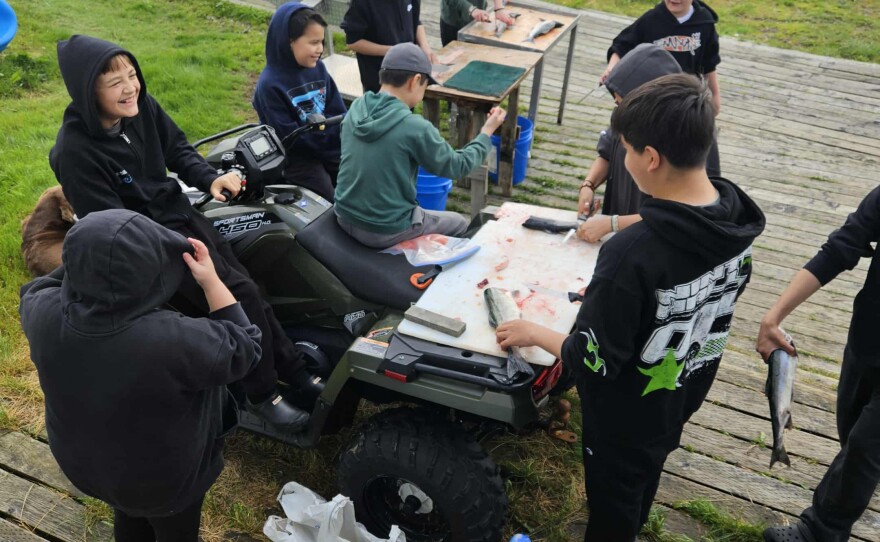The K–12 school on Akutan Island in the Aleutian chain has two teachers. Last year was the first time they were local Unangax̂ residents — and they're continuing to teach this year. The teachers say their first year brought challenges, but also the chance to reimagine what learning could look like for their students.
At the start of the 2025 school year, students and staff gathered at the head of Akutan bay to fish for humpies. The school of 16 students learned how to catch, fillet, and put up their fish for drying.
For middle and high schoolers, that meant learning with Jacob Mark Stepetin. He's in his fourth year of teaching, and his second year back home in Akutan — where he was once a student.
"I didn't want to be the teacher that I had when I was in Akutan," Stepetin said. "Not that they were terrible teachers, but it was more like, we can't teach everybody everything, so here's your book, sit at your desk, and do the work at the back of the chapter. What I really wanted to figure out was, what's the alternative? How can it be better than that?"
Stepetin says he's still searching for the best approach. What he does know is that hands-on learning matters — especially when it connects students to their culture and place.
"It's the most frustrating thing when the sun comes up, there's blue sky and the water is calm," he said. "There's so much more to learn on the land than out of a book."
In Alaska, nearly 80% of students in rural schools are Native, but only about 5% of teachers are Indigenous.
Karen Ravenscroft, the school's principal and K–6 teacher, has worked at the Akutan school for more than a decade — and like Stepetin, was a student there too. She says having two teachers from the community has been transformative.
"I think it went really great, just for the fact that Jacob Mark cares about the students as much as I do," Ravenscroft said. "Both him and I were able to bring cultural stuff into the school."
Last year, older and younger students worked side by side on projects, making fish prints, yarrow-infused oil, and blueberry jam. The school also hosted a traditional dance unit, inviting the community to join.
"The highlights for me were the fact that we were able to work together and bring the middle school, high school, and elementary students together as a whole," Ravenscroft said.
After completing their fish unit at the beginning of the school year, students decided to hand out their first batch of dried fish to Akutan elders. Ravenscroft says moments like these reflect how deeply kids are connected to the land.
"I definitely want to encourage my students to have a love of learning," she said.
With more place-based lessons planned for the rest of the year, Akutan's two teachers say there's comfort in working alongside another person from the community — knowing they want the same thing for their students: a school experience that's culturally relevant and rooted in place.
Copyright 2025 KUER 90.1




